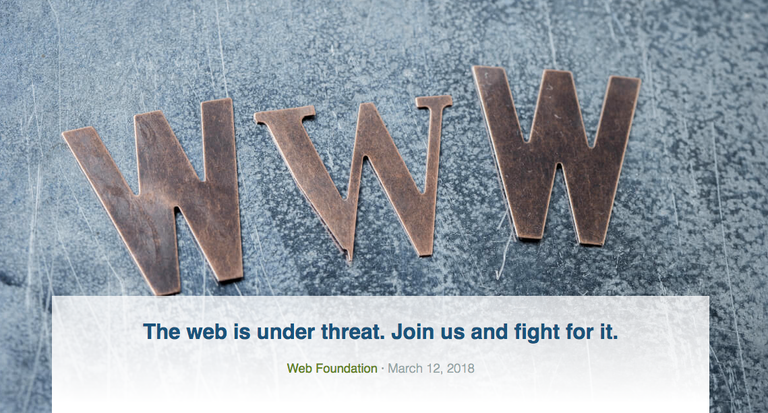Tim Berners-Lee, the inventor of the World Wide Web, published a public letter today on the 29th birthday of the World Wide Web.
It talks about some of the issues the web is facing, for example the centralization and therefore concentration of power over the internet in a few big tech companies, especially when it comes to social media, which coincidentally I covered just a few days ago in my article about decentralization. And that's what I'm going to focus on in this post, because in the letter, Tim Berners-Lee calls for regulation of social media companies to make them work for the "social good" instead of maximizing for profits. Quote from the letter:
Companies are aware of the problems and are making efforts to fix them — with each change they make affecting millions of people. The responsibility — and sometimes burden — of making these decisions falls on companies that have been built to maximise profit more than to maximise social good. A legal or regulatory framework that accounts for social objectives may help ease those tensions.
The Guardian has just published an article about this as well and they too focus on this part of the letter. It's not surprising because calls for more regulation of the internet have been getting louder and more frequent lately, not just from one side of the political spectrum either, so it's a very hot topic. Politicians feel that control over social media is too much power in the hands of big tech companies. While the left in the US focuses more on how this influenced the US election for example, and the right about conservatives allegedly being censored, the end result is the same, they both want the same thing, and that is more government control of the internet.
I'm not going to force my opinion on you here, I couldn't do that if I wanted to because I haven't fully made up my mind about this issue yet either, but I do want to ask you to think long and hard about the question if it's good for the US government to exert more control over the internet to reign in Google, Facebook, Twitter and co. It's very easy to give a government more power, but increasingly unlikely to be able to take it away again.
Regulating social media companies could mark a historic change and could lead to some terrible consequences for freedom on the internet. Personally, I'd rather just decentralize the internet and take the power away from both governments and big tech companies, but while the technology to do that is getting better and better, there are still a few problems that need to be solved to make mainstream adoption of decentralized networks feasible, and there is no telling how long solving these problems could take.
I am not at all happy about the power big tech companies have when it comes to speech on the internet, but I'm even more suspicious about governments having that power. I'm also very suspicious when terms like "social good" or "common good" are used, which as far as I can tell are complete nonsense terms. If there was such a thing as a common good, we'd all vote the same and never change our opinions, the same party would govern forever, but that doesn't happen. We all disagree wildly on what goals are good and how to best achieve them and (hopefully) change our opinions all the time as we are presented with better information.

I myself wholeheartedly support net neutrality and I'm against any control over the Internet. Cause nothing good could come from that.
Net neutrality is a bit of a special case, the vast majority of people support government control of the internet to assure net neutrality. I would normally be completely against it on the basis that you shouldn't give a government more power unless it's absolutely necessary, but in the case of the US for example where ISPs really do have monopolies in some areas without a single competitor it seems like a necessary evil.